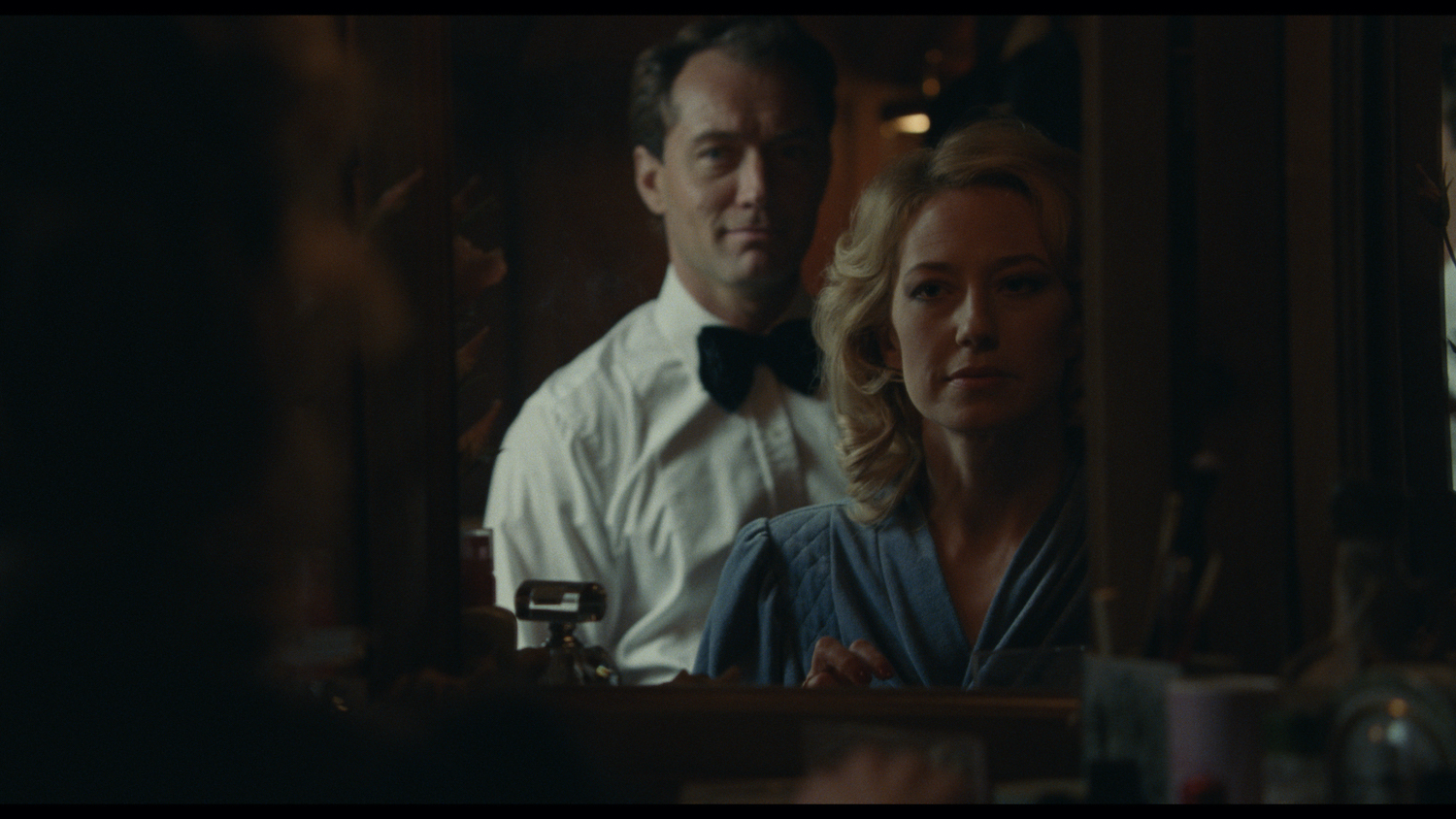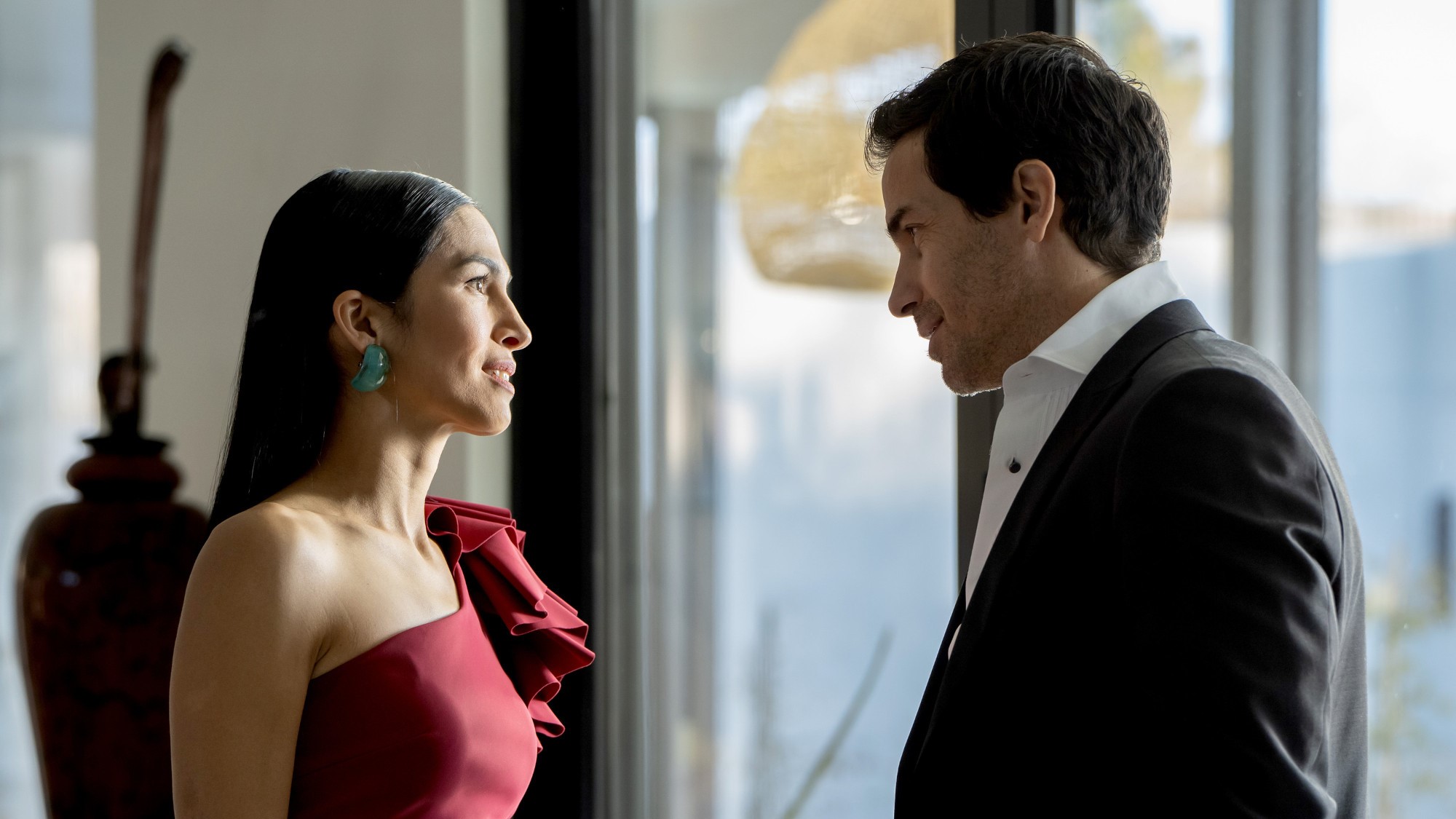What to Watch Verdict
Sean Durkin's film generates a haunting air of melancholy as he quietly spotlights the lies told between partners, and especially to ourselves, that threaten our most sacred relationships.
Pros
- +
💸 Durkin's horror movie-like atmosphere creates a palpable sense of danger even in the film's most innocuous moments.
- +
💸 Jude Law and Carrie Coon are both incredibly powerful as the dueling husband and wife trying to protect their relationship, and also themselves from it.
Cons
- -
💸 Durkin's sense of specificity and isolation leaves a few questions lingering after the film's end.
The Nest exists at a mythical halfway point between Noah Baumbach’s Marriage Story and the Safdie brothers’ Uncut Gems, an engrossing story about a family not-so-slowly edging into crisis because of a husband’s increasingly risky maneuvers. But written and directed by Seam Durkin, at least as distinctive a filmmaker as the others, it mines that recognizable territory but resembles neither, oozing unhurried discomfort while honoring a focus on the family as a unit, even if it’s a fractured one. A striking drama that delivers some of the year’s best performances, The Nest investigates the minutiae that makes and breaks relationships, bound together by the love we try to create together, but often as much by the pain we hope to escape alone.
Jude Law (Captain Marvel) and Carrie Coon (Widows) play Rory and Allison, a married Brit and a New Yorker who agree to move to England when he receives an opportunity to work for a former boss. Disrupting Allison’s work as a horse trainer and uprooting their children, Rory rents an enormous estate outside of London and begins spending lavishly to give them all of the opportunities he never had as a child, including buying a horse and putting their two kids Benjamin (Charlie Shotwell) and Sam (Oone Roche) in posh schools nearby. But as they struggle to settle into a new life far away from friends and family, Rory’s ambition begins to race out of control at work, while Allison becomes restless, and eventually, concerned when bills go unpaid.
Rory continues to insist that big paydays are right around the corner, while Allison grows increasingly distant — first from her husband, who she no longer trusts, and then her children, who are consumed by their own alienation and unhappiness. Soon, Allison find herself at a crossroads in a relationship that is rapidly deteriorating, while reality begins to close in on Rory’s big dreams, forcing him to choose between the family he already has or the ambitions that are still unrealized.
Durkin’s Martha Marcy May Marlene was one of the biggest debuts at the 2011 Sundance Film Festival, and deservedly so: the film’s mesmerizing portrait of a young woman escaping the clutches of a cult explored a fascinating subject in a way that was both ratcheted with tension and uniquely humane. Somewhat similarly, The Nest feels almost like a low-key horror film as the characters inhabit a big, creepy house full of surprises, distant from neighbors, and navigate hallways — and choices — full of risk and darkness. And also like that film, the relationships on screen are more complicated, fraught with history and expectation, than the audience initially learns. Certainly “relationship problems” are a familiar fulcrum for drama and moving to a new and unfriendly place is always an effective catalyst for exposing problems that always existed. But Durkin explores those problems in a way that’s both extremely relatable and absolutely mesmerizing even when they aren’t.
Set in the 1980s, the film occurs during a period of tremendous economic growth, opportunity, and criminality — and it comes as no surprise that the effortlessly charming Rory hopes to capitalize on the first two, and is probably at least okay with the third. Though we don’t see the full extent of Rory’s overreach, the way that information unfolds, and presents itself to the formidable but trusting Allison, becomes a driver for their estrangement, and eventually, the complete breakdown of the family as a whole. Law’s character is a fascinating, identifiable type, a hard worker with a chip on his shoulder, and more determination to succeed than discretion. Consequently, when Allison watches him, and supports him, she sees what all of his effort is aimed towards — surfaces, the presentation of affluence, and an almost pathological need to lie to impress others. She soon begins to feel like she’s been conned along with his clients, but her own unhappiness becomes too oppressive for her to, first, make the best of or try to repair the damage he causes, and two, counter that with solidarity and support for their kids.
This is a kind of character Law has played before, and played well, a handsome charmer whose need to convince others what he’s saying is exceeded only by the need to convince himself. His performance particularly as Rory’s life begins to fall predictably apart is where he does his best work, blindly pressing forward and overshadowing even the natural knowledge and talents he has in an increasing act of desperation. As Allison, Coon is more than Law’s equal, fighting to protect their family but unable to carry the weight of his false promises and his failures for any longer, especially after giving up her own for him. Their relationship is barb-tongued and contentious, but they also manage to convey the love and the real desire to be with one another and make it work, that makes the problems seem that much bigger and more menacing.
To return to that Uncut Gems-versus-Marriage Story analogy, Durkin isn’t gambling with the style and pacing to see how much tension audiences can stand, or simply documenting the fallout of decisions already made. Rather, he’s documenting the survival of a relationship built from faulty blueprints, exposing exactly how these baked-in yearnings and emotional blind spots can wreak havoc because they started controlling our choices before there was anything, or anyone, else to consider. To that end, film feels like a companion piece to Martha Marcy May Marlene but also a fascinating leap forward in maturity and mastery of tone; he never lets the “creepy” factor run too far into melodramatic territory, and allows the risks that each character takes, and the dangers they encounter, feel tense but believable. All of which ultimately makes The Nest as much a cautionary tale as a character study: Durkin’s overdue second feature keenly observes the small moments that forge connections, as well as those that break them, with only the truth in between — that is, what we tell to our partners, but more importantly, to ourselves.
The Nest will be available on VOD November 17th, 2020.
Todd Gilchrist is a Los Angeles-based film critic and entertainment journalist with more than 20 years’ experience for dozens of print and online outlets, including Variety, The Hollywood Reporter, Entertainment Weekly and Fangoria. An obsessive soundtrack collector, sneaker aficionado and member of the Los Angeles Film Critics Association, Todd currently lives in Silverlake, California with his amazing wife Julie, two cats Beatrix and Biscuit, and several thousand books, vinyl records and Blu-rays.












